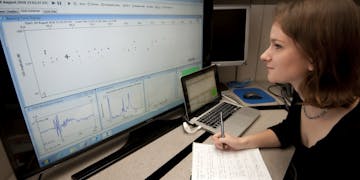Spending a summer on an ocean-research project, developing a new instrument for collecting deep-sea samples, and writing science news stories are among the experiences that have proven to be life-changing for many of MBARI’s summer interns. The primary goals of the 10-week paid internship are to provide a unique educational experience for the intern and contribute to the general good of the oceanographic community.
In the 23 years since its inception, the MBARI Summer Internship Program has hosted some 340 undergraduate and graduate students and educators. The program has grown to host as many as 21 interns for the summer program, offering a wide range of potential projects in science, engineering, communications, and education. Rather than focusing on a particular discipline, the program aims to help interns discover what research is really about and where their interests might lie.
Overall, the internship raised more questions than it answered, but they were questions that I never thought of asking. – Intern evaluation response
MBARI’s internship program is open to undergraduates, graduate students, and educators. It attracts more than 250 applicants a year from all over the world, and draws on the support of the entire institution as projects and mentors come from all areas of MBARI.
During the summer, interns work closely with their mentors and often, with an entire workgroup of scientists, engineers, or outreach experts. They also work with each other, which helps emphasize the peer relationships between scientists and engineers and reflects MBARI’s mission. The interns meet weekly, attend a variety of MBARI events, and participate in several enrichment activities such as a behind-the-scenes tour of the Monterey Bay Aquarium, kayaking, a geology field trip, a tour of NASA Ames Research Center, and events with interns from neighboring institutions. The interns also bring their energy and enthusiasm to the annual MBARI Open House, where they engage with the visiting public. At the end of the summer, all of the interns give formal presentations, and their final written projects are posted online.
Many intern alumni have gone on to highly successful careers in medicine, writing, law, consultancy, art, non-governmental organizations, state or federal agencies, education, and academia. A number of summer interns have even returned to MBARI as postdoctoral fellows or long-term employees or have found jobs at the neighboring Moss Landing Marine Laboratories and Monterey Bay Aquarium.
Interns consistently indicate that they value their time at MBARI and the support of the staff. The interns have pursued a variety of paths, including these examples:
- Karen Osborn earned a PhD; currently, serves as a research zoologist and curator of marine invertebrates at the Smithsonian National Museum of Natural History; and is an MBARI adjunct who regularly collaborates with our staff.
- Dijanna Figueroa earned a PhD; starred in James Cameron’s feature film, The Abyss; and currently serves as the upper school science director at St. Matthews Parish School (Pacific Palisades, California).
- Amos Winter is currently a professor at the Massachusetts Institute of Technology; was awarded a National Science Foundation (NSF) Faculty Early Career Development award; has earned numerous awards for his innovative ideas, such as a low-cost wheelchair and an inexpensive desalination device; and is the co-founder and chief scientific advisor for Global Research Innovation and Technology.
- Stacy Jupiter earned a PhD; currently serves as the director of the Wildlife Conservation Society’s Melanesia Program in Fiji; and in 2019, was named a MacArthur Fellow.
- Katrina Hoffman earned a graduate degree from the University of Washington and is currently the president and CEO of the Prince William Sound Science Center (Cordova, Alaska) and executive director of the Oil Spill Recovery Institute.
- Sasha Tozzi earned a PhD from The College of William and Mary and is executive director of Microbiotech Solutions, LLC (Lexington, KY) and the director of research and development at GenCanna (Winchester, KY).
- Jennifer Magnusson and Katie Lodes both have provided ongoing support to MBARI’s EARTH educator professional development program. Lodes was recognized in 2019 with the Presidential Award for Excellence in Science, Mathematics, and Engineering Mentoring.
In addition to institute funding for the program, some interns receive support from external grants and partners. Generous multi-year gifts from the Dean and Helen Witter Family Fund and the Rentschler Family Fund in memory of former MBARI Board Member Frank Roberts, will strengthen and grow this highly successful program. As we enter the 24th year of the internship program, it is clear that the benefits to the institution, to the science and engineering communities, and certainly to the interns make this program successful and worthwhile. The personal connections that are formed through these shared experiences are perhaps the greatest outcome of all.
The interaction with all the different people here was the greatest thing. I feel that an internship should be experiential, not just do this and do that. I’m sure that we all came out of this with the methodology that we aimed to learn, but we also came out of it with the frustrations and revelations that research brings. But for me, the most important of all was being able to focus all my attention on one project. – Intern evaluation response
